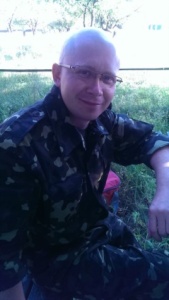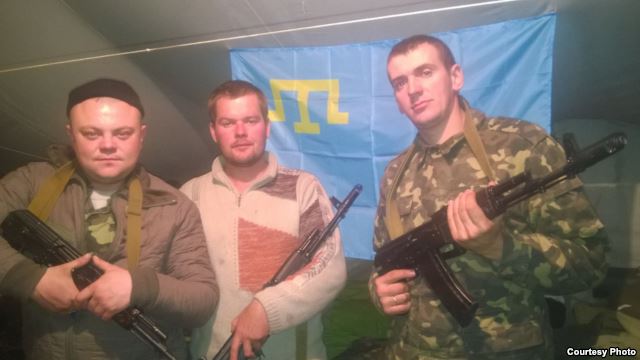Ukrainian businessman, Oleksiy Hirenko worked for a Russian company in Ukraine. He was then invited to Moscow, where he lived for the past year and a half. Now, his life has changed dramatically… Oleksiy has been training in one of the Ukrainian army camps and waiting to be deployed to the ATO zone. Hirenko calls himself a Crimean Tatar although he has no Tatar blood; he says that he has decided to “become part of that nation” in solidarity with the Crimean Tatars after the annexation of Crimea.
Oleksiy Hirenko told Radio Liberty why he left Russia and took up arms, whether the situation in the Ukrainian Army has changed for the better under the new defense minister, and whether he is planning to go and see his friends in Moscow after everything that has happened.
– How long have you been a volunteer? What did you do before?
– I became a volunteer on August 27. Before that, I lived and worked in Moscow for a year and a half, and earlier in Ukraine, of course. I’m 32 years old. I spent most of my life in Zaporizhya. After Yanukovych came to power, I moved to Kyiv as I had some problems with my business. I managed the Russian representative office in Ukraine, and then, a little later, in February of last year, I was invited to Moscow. I ran another firm there, but decided that, given the annexation of Crimea, it was unethical to continue working in the aggressor country and contributing to its economic development. I couldn’t allow that for various reasons. I returned to Ukraine and joined the army as a volunteer.
– You call yourself a Crimean Tatar, but you don’t look like one. What does all this mean?
– Actually, this story is ironic, funny and at the same time dramatic. I became a Crimean Tatar quite recently, in May of this year. I’m a man with a sense of justice who can’t be indifferent to what’s happening now. I told all my friends that I’d become and will remain a Crimean Tatar until Crimea is no longer annexed. I decided that I’d do everything in my power to help my Crimean Tatar people to return to their birthplace. This nation has endured great suffering; they were deported for 70 years and were then given the chance to return home. I can’t say that Ukraine has done something particularly good for the Crimean Tatar people, but I also can’t say that our country has oppressed them or denied them their rights. I talked with friends and they said: “Well, okay, what’s happening to the Crimean Tatars is happening to everyone now.” Then I said: “Listen guys… actually I’m a Crimean Tatar!” By morning, some friends noticed that I even looked different. But anyway, I followed this through, even after I returned to Kyiv. I’m a Crimean Tatar in solidarity with this nation. And, I’ll remain a Crimean Tatar until the autonomy of Tatar Crimea has been re-established within Ukraine.
– So, you perceive your mission as revenge for what happened and is still happening with the Tatars in Crimea after its annexation by Russia? When were you last in Crimea?
– I was there two years ago. Yes, now it’s not only the pain and suffering of the Crimean Tatar people, it’s the pain and suffering that every normal person in Ukraine is feeling. Therefore, now I’m totally with the Crimean Tatars… my soul, my beliefs, and my actions.
– What’s your impression of the Ukrainian army volunteer training camp?
– You know, I didn’t live long under the Soviet Union. But, our army and everything associated with it can be called “sovok” (ingrained Soviet mentality-Ed.) – the leaders have no consideration and no empathy, starting from the officers up to the highest ranking generals. They’re completely indifferent to the fate of those who are in their charge. Today’s army consists of people who’ve come to defend their homeland. There’s a gap between this and the ideals that people supported on Maidan. Anyway, this is how it is now. I don’t regret that I didn’t serve in the army earlier because I wanted to continue my studies. If it weren’t for this situation, there’d be nothing for me here. But, here I am and it’s what we have to do. All of us – the Ukrainian people, the Crimean Tatars, Jews, and Armenians – were very slow to realize that we weren’t just a bunch of cattle. Now we have to pay for it…

– Maybe some positive changes have taken place in the army with the new Minister of Defense?
-The day Poltorak was appointed Defense Minister, the guys were sitting around the table and saying that before we could get a liter, but now we’ll only get half. That’s all that was said. Anyway, as an ordinary soldier, I don’t see these changes. Of course, I see important and fantastic changes among our countrymen, volunteers and people, who come here, help and support us, and write letters. That’s true. We’ve never seen so much empathy and sharing in our country after the Orange Revolution. By and large, we are all providing for ourselves here. We take care of one another, as do our volunteers and our loved ones. Whereas it seems that our commanders, in any case, get us together in the morning, send us off somewhere, and issue some special orders to clean up a territory or something like that. We repair our equipment with our own money and the help of volunteers. Today, something nice happened in my group… some volunteers arrived. In one day they managed to do what we couldn’t do in two weeks, while the army didn’t even try… they fixed our equipment. The vehicle is operative now and I hope we’ll still get a lot out of it.
– You wrote in Facebook that you’ll be sent to the ATO zone on November 11. Do you know where you’re going and what it will be like there?
In fact, we were told that we’d be leaving the 11th, but others say that it can happen literally tomorrow. Most guys who are with me – and I’d say about 40% – are volunteers, and are waiting to get out there as soon as possible. Because our conditions here are…. This is the third deployment, the third unit for me. They’re always sending us somewhere, retraining us to use other types of guns. And it keeps getting worse and worse. In my opinion, we’ve reached the depth of apathy. But, this is war, and only a fool would think that war is romantic or heroic. Any war, wrote Henri Barbusse (French novelist and member of the Communist party-Ed.), and I fully agree with him, is collective suicide. But, we are defending our homeland. We all understand, know and talk to people who are returning from the ATO zone. This is a full-fledged war. Each of us may die, come back a cripple or completely useless for our relatives. That’s just the way it is.
– Do you know whether you’re being sent to the Donetsk or Luhansk oblast? Is there a lot of fighting where you’re going?
– We’re told that we may be going to Donetsk oblast. But again, from previous experience, sometimes guys are told that they’re being deployed to Melitopol, and they’re actually sent to Mariupol. The name begins and ends with the same letter, you see… so, there’s a lot of confusion. But, they’ve really prepared us, so we’re sure it will be in the ATO zone.
– You said that you worked for a Russian company in Kyiv, and then lived in Russia for one and a half years. You probably have lots of friends in Moscow. Aren’t you afraid that you won’t see them anymore now that the door to Russia is probably closed for you?
– I know that won’t see them very soon. There’s nothing to be afraid of. This is a fact. I’m well aware of that. Really, I have wonderful and good friends in Russia whom I met through a variety of projects and activities, and who helped me. To the surprise of many people, my Russian friends support me and often write. Some even say – and I particularly like this – that Russia’s freedom begins in Ukraine; they say: “We’re with you!” I realize that I won’t go back to Russia, or should I say not until the Kremlin yoke and Vladimir Putin’s regime are gone. I don’t regret anything, because my country is here, not in Russia.





